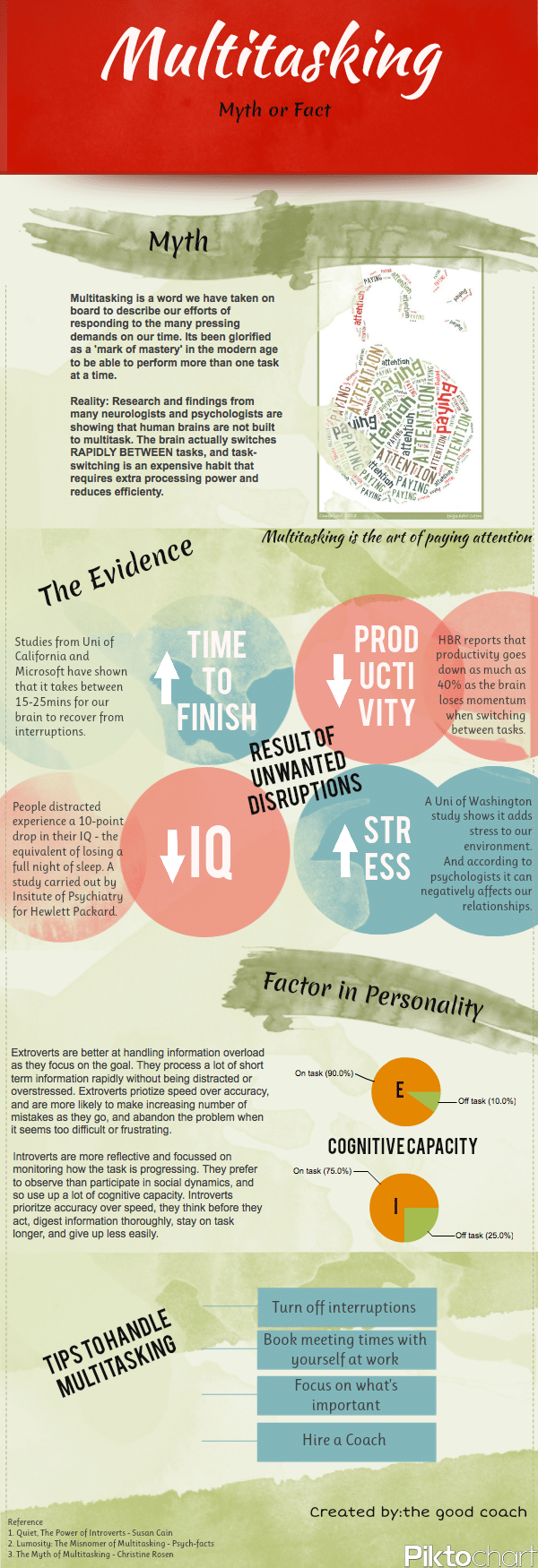I remember back in the ’90s when the Amiga computer sort of introduced the multitasking feature on a personal computer. It was as huge of a deal as the iPhone was when it was first announced. Suddenly you could do things with your computer that enabled the user to take the technology beyond what even the manufacturer could imagine. The word multitasking itself was commonly used among computer geeks, and it sort of got introduced into the everyday lives of people later on. To multitask meant to time optimize, which enabled you to be able to do more things, period. However, there are few people out there that can truly incorporate the multitasking ability into the human mind.
It so happens that it solely depends on your personality whether you can multitask with good results, or if you can do it during a short period of time. This infrographic from The Good Coach takes some data provided by the University of California and Microsoft and lays it out. What it reveals is that introverted people are more likely to solve problems than extroverts. An extroverted person doesn’t stay with the problem until it is actually solved, but instead they often give up on finding a solution for it and move onto something else.
What’s further interesting is the fact that this research shows that it takes the human brain 15-20 minutes to recover from an interruption while you work. This is astonishing considering that we have phones ringing, people knocking on doors and constant interruption variables in an office environment, especially in office landscapes where there are a lot of cubicles. This basically tells me that giving each employee a room of their own would significantly increase their productivity and focus.
That in turn would lead to greater things and a more rapid progression when it comes to results. Everything is of course relative, and you have to factor in the fact that some people will actually perform better when they have a lot of people around to inspire them. The same goes for the opposite. Some people would probably work way better alone at home than in an office since their creativity is solely driven by results and any interruptions will render their efforts useless in the long run.
The tips to enable you to multitask better are quite basic. Turn off any distractions, whether that means turning off your cell phone or closing the window. All of these factors impact you attention and focus which in turn decreases your ability to generate good results. Don’t think that just because you are an extroverted person that you won’t be able to multitask. The research only shows that introverted people are better suited to multitask, not that they will create great things just because of it. Extroverted people might have a harder time multitasking, but they make up for it by making sure they are ahead of the game by interacting with people who help them do things.
I am quite sure that multitasking is a mind trick that you can train yourself to do. From personal experience, I have found that continuous multitasking can become a normality for your brain. Preparing your brain to process more information than usual makes it more aware of it, and you learn to process it faster. This doesn’t mean you will be able to teach yourself things faster, only that you will be able to sift out the non important information that is streamed through your senses. Compare it to someone who can sift through a page in a book in a couple of seconds and know exactly what it is all about. They haven’t read the entire page in that short period of time, they have merely learned the skill of how to find the key words that make up the story of it.
So, in order to multitask, all you really need to do is to introduce yourself to a couple of main outputs of information and tap into them. Sift through what is important and process it together. That way you will always teach yourself to become a better multitasker. Great multitaskers aren’t intelligent or geniuses, they have just learned how to process the important information and skip the non important. That’s what multitasking is all about, at least when it comes to the human brain.
Via: [Visual.ly]

COMMENTS